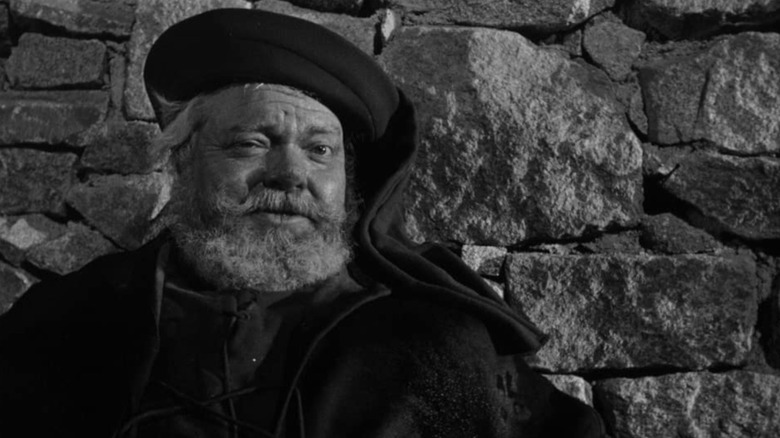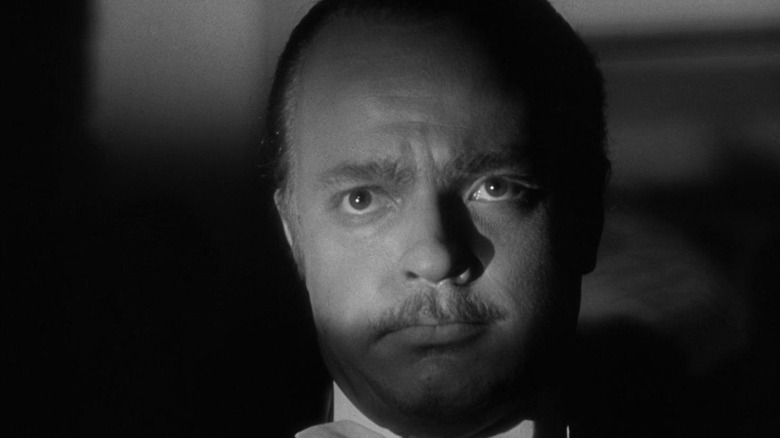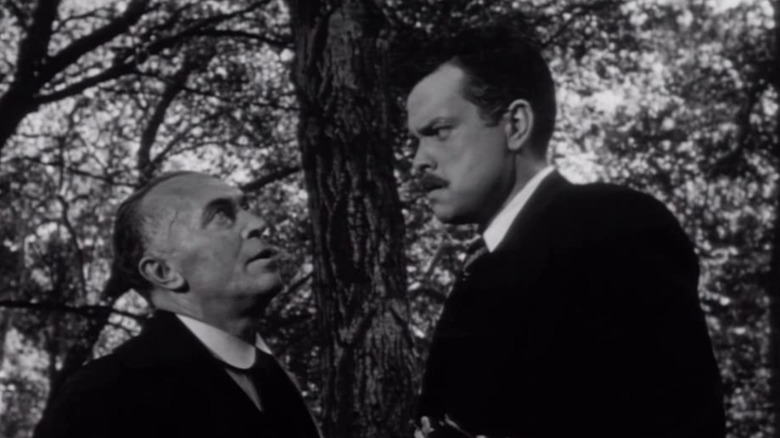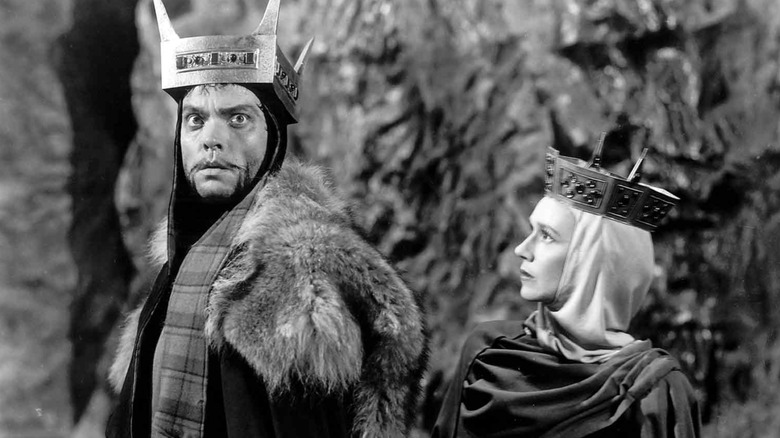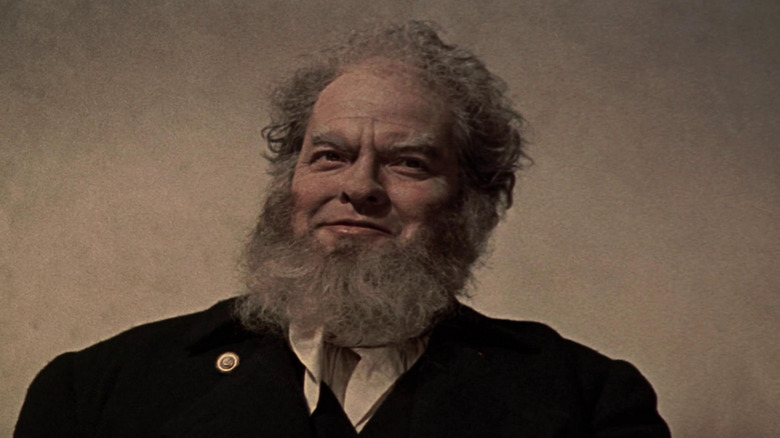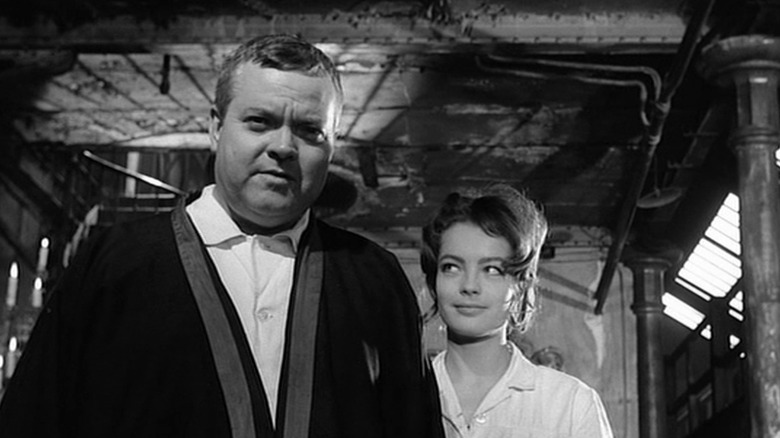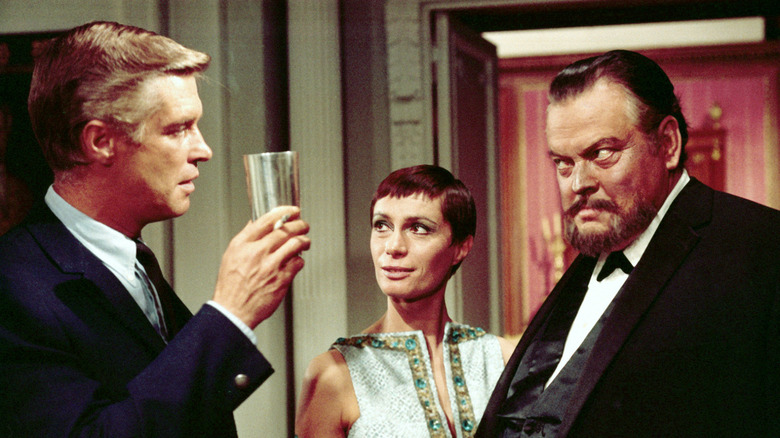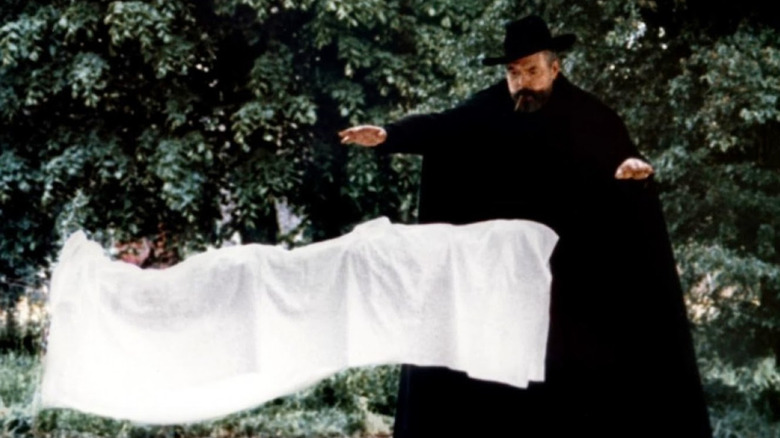7 Unfinished Orson Welles Projects (And Why They Didn't Happen)
"Citizen Kane" director Orson Welles was a highly prolific and influential filmmaker, to say the least. His obsession with exploring power through unconventional means has resulted in some of the most acclaimed films in the American movie canon. While some of his movies were not fully appreciated in their time, it's hard to overstate the influence Welles has had on filmmaking and filmmakers to this day.
However, for as many movies as he was able to make, there were just as many that he didn't couldn't to life. For a variety of reasons, many of Welles' projects wound up never seeing the light of day. These films have long been the subject of speculation and confusion, as there often isn't a lot of available details about them. However, that just makes these unfinished films that much more interesting to learn about. And you're looking for a guide to some of the most interesting yet unfinished Welles movies, you've come to the right place.
One important thing to note is that this article will not include Welles' movies that were completed and screened posthumously. These types of projects include "Too Much Johnson," "The Merchant of Venice," "It's All True," and "The Other Side of the Wind." Movies that used to have Welles' involvement but moved on without him, such as "Cyrano de Bergerac" and "Around the World in Eighty Days," are similarly not included.
Heart of Darkness
What it was about: This film was supposed to adapt Joseph Conrad's novella of the same name, with Welles playing the starring role of Charles Marlow. In the film, his character would be tasked to become the captain of a ferry boat somewhere along the interior of Africa. Throughout his time as captain, he would discover the dark truths about the European colonization of Africa, as well as what happened to a promising captain named Kurtz, who was presumed to be sick.
What killed it: According to the book "This is Orson Welles," which compiled conversations between Welles and director Peter Bogdanovich, "Heart of Darkness" faced two major problems. The first was that its $500,000 budget had ballooned up to $1.1 million, and the second was the outbreak of World War II. With these setbacks in mind, the project was canceled, and "Citizen Kane" was Welles' debut film instead.
Could it be revived? Most likely not. A few test shots were said to have been filmed, but they are now considered lost and are sadly unlikely to resurface (although the possibility of their preservation is never entirely out of question). Furthermore, Francis Ford Coppola's "Apocalypse Now" took heavy inspiration from the novella, making it the unofficially definitive adaptation of Conrad's work.
The Way to Santiago
What it was about: Based on Arthur Calder-Marshall's book of the same name, this movie would have been partly a love story and partly a World War II espionage thriller. The film was slated to center around an American journalist visiting Mexico and finding love with a beautiful woman named Elena. Unfortunately, love isn't the only thing he stumbles across, as he also uncovers the existence of Nazis planning a coup against the Mexican government. Further details on the plot aren't public, but it sounds like it could have been akin to 1942's "Casablanca," swapping Morocco with Mexico.
What killed it: The exact reasoning behind the cancellation of "The Way to Santiago" is not exactly clear, but there are a couple of things we do know about what led up to it. According to "What Ever Happened to Orson Welles? A Portrait of an Independent Career" by Joseph McBride, the Mexican government had to approve of filming before it began, which they didn't do. RKO was reportedly not too keen on moving forward with the project, either, so the film was dead on arrival.
Could it be revived? If someone was able to purchase the rights to the completed screenplay, Welles' vision for the movie may come to partial life. You are actually able to read the screenplay online on websites such as Scribd if you're curious. However, a new version surely wouldn't be the same without Welles behind the camera.
The Life of Christ
What it was about: The title might seem like it says it all, but Welles was looking to do something different for this biblical movie. Instead of being set in Jerusalem in the B.C. years, "The Life of Christ" was written to be set in the American West in the 1890s. Why this change in scenery was made is unclear, but it certainly sounds like it would've made for an interesting take on a familiar story. Plus, we could have seen Welles as a cowboy, something we were absolutely robbed of.
What killed it: When the movie was discussed in the conversations highlighted in "This is Orson Welles," a reason behind the cancellation was not given. However, it's likely that it was due to budgetary reasons; no matter what time period you set it in, a biblical epic is always going to require a big budget to pull off. How in the world are you going to depict the parting of the Red Sea (or, in this case, maybe Lake Tahoe) without at least a million dollars? (And yes, we know "The Life of Christ" wouldn't depict Old Testament imagery — let us have this joke.)
Could it be revived? There seems to be no archive of the film's script, at least not publicly like how the script for "The Way of Santiago" has been preserved.
Moby Dick – Rehearsed
What it was about: This movie was not slated to be your traditional film, as it was actually a recorded stage production of Welles' take on "Moby Dick." What made this play unique was the fact that it used as few props and decorations as possible in order for the audience to imagine the threat in their heads. For example, there was no ship or boat prop on stage, but rather a plain stand that the actors would mimic movement on.
What killed it: What makes "Moby Dick – Rehearsed" different from other projects on here is that the movie actually was complete. Actor Kenneth Williams wrote so in his autobiography "Just Williams" that the entire play was shot and edited. However, its cancellation came down to one simple factor — it didn't look good on film. Welles was supposedly displeased with the film, and Williams even said that he could barely watch it because it was just too dark. Literally.
Could it be revived? Despite being complete, the movie is said to have been lost. Of course, that doesn't mean that there isn't a chance it could be found, but for the time being, we won't be seeing this unusual take on the story of "Moby Dick."
The Heroine
What it was about: "The Heroine" was supposed to star Oja Kodar, Welles' former partner, as an influential French widow circa 1870. Her story runs parallel to that of the Franco-Prussian War, and she eventually gets arrested at the hands of Prussian authorities. She finds herself in a difficult situation when she and her fellow prisoners are given the opportunity for freedom only if she collects her French passport naked. It was slated to be the first entry in a two-entry anthology movie based on Isak Dinesen (Karen Dinesen) stories.
What killed it: The cancellation of this film was the result of an allegedly hostile crew. The biography "Orson Welles at Work," written by Jean-Pierre Berthomé and Francois Thomas, claims that Welles didn't like the Hungarian film crew he was working with, fearing that they weren't skilled enough. His suspicions mounted when he received a bill for a day's worth of shooting that was far more expensive than what was originally discussed. He fled Hungary the next day, abandoning the production altogether.
Could it be revived? The footage that was shot for the movie has been declared lost, and according to Heritage Auctions, the only remaining script was sold to a bidder in 2018. Unless the footage is found again and the owner of the script wants to be generous, it looks like we will never see a revival of "The Heroine."
The Deep
What it was about: This project would have been another literary adaptation, this time adapting the Charles Williams novel "Dead Calm" with a new title. Two lovers on their honeymoon find temporary solace on their boat, which is currently coasting through the Indian Ocean. However, this bliss is interrupted when they encounter a man who claims to have fled a U.S. Navy ship under strange circumstances. Tensions flare as it is revealed that the mysterious man isn't who he claims to be.
What killed it: The cancellation of "The Deep" is the result of a couple of different roadblocks. The first was, naturally, whether it had a chance of success against its large budget. It is also very possible that its planned two-year filming schedule resulted in additional budgetary issues. If you've been following along with this piece, you might be noticing a pattern regarding abandoned Welles projects and funding problems, and that is because the director was notorious for not relying on studios or companies to fund his projects.
Could it be revived? While the original print is considered lost, there are two incomplete work prints that have been preserved, yet both extremely incomplete. One of these prints was screened at the Museum of Modern Art in 2015 with provided commentary on what was supposed to be happening or said between characters. It has yet to be released to the public, and if we're being honest, it probably never will. It also shouldn't be considered the definitive adaptation of "Dead Calm," as it was adapted into a 1989 thriller by Phillip Noyce.
King Lear
What it was about: If you took a Literature 101 course in college, you're probably familiar with the story of "King Lear." However, here's a quick recap if you've either forgotten or haven't had this college experience: The titular king of Britain is aging and is anticipating his own death in the near future. In preparation for the worst, he divides his wealth and land between two of his daughters, Goneril and Regan, while also cutting his youngest daughter, Cordelia, out entirely. However, not everything is as it seems, and Lear finds himself drifting further into madness as his reign draws to a close and his nation is engulfed in war.
What killed it: The talks to adapt "King Lear" into a movie came at a very inconvenient time. Shortly after negotiations began, Welles passed away due to complications from a heart attack. It's a shame, because Welles' previous attempts at Shakespeare, which include "Macbeth" and "Othello," are some of his finest works. He could have done wonders with "King Lear."
Could it be revived? Considering the film was not even finalized before Welles' death, there is no way his version of the Shakespeare play will ever be realized. Who knows what it would've looked like. Perhaps it would have been set in modern times, or maybe it would have surrealist elements. We'll never know.
